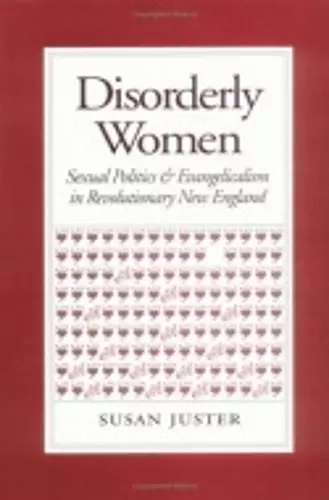Disorderly Women
Sexual Politics and Evangelicalism in Revolutionary New England
Format:Paperback
Publisher:Cornell University Press
Published:24th Oct '96
Currently unavailable, and unfortunately no date known when it will be back
This paperback is available in another edition too:
- Hardback£47.00(9780801427329)

Throughout most of the eighteenth century and particularly during the religious revivals of the Great Awakening, evangelical women in colonial New England participated vigorously in major church decisions, from electing pastors to disciplining backsliding members. After the Revolutionary War, however, women were excluded from political life, not only in their churches but in the new republic as well. Reconstructing the history of this change, Susan Juster shows how a common view of masculinity and femininity shaped both radical religion and revolutionary politics in America.
Juster compares contemporary accounts of Baptist women and men who voice their conversion experiences, theological opinions, and proccupation with personal conflicts and pastoral controversies. At times, the ardent revivalist message of spiritual individualism appeared to sanction sexual anarchy. According to one contemporary, revival attempted "to make all things common, wives as well as goods." The place of women at the center of evangelical life in the mid-eighteenth century, Juster finds, reflected the extent to which evangelical religion itself was perceived as "feminine"—emotional, sensional, and ultimately marginal.
In the 1760s, the Baptist order began to refashion its mission, and what had once been a community of saints—often indifferent to conventional moral or legal constraints—was transformed into a society of churchgoers with a concern for legitimacy. As the church was reconceptualized as a "household" ruled by "father" figures, "feminine" qualities came to define the very essence of sin. Juster observes that an image of benevolent patriarchy threatened by the specter of female power was a central motif of the wider political culture during the age of democratic revolutions.
A groundbreaking book that should appeal to both popular and scholarly audiences. Because Juster is such a clear and forceful writer, her book is a pleasure to read.
* Christian Century *Cogently argued and wonderfully written, Disorderly Women is an insightful and inspiring work on gender and religion in Revolutionary New England.
* William and Mary Quarterly *Juster examines the changing role of Baptist women in Colonial and Revolutionary New England. At first essentially equal to men in church governance and in the right to speak in church, women were gradually excluded from power in Baptist churches after the Revolution. As the Baptist church adopted a more patriarchal model of church organization, women were not only marginalized and silenced but associated because of gender with several serious sins, including sexual misconduct, lying, and slander.
* Library Journal *Susan Juster's valuable book traces the emergence and collapse of gender equality among New England Baptists from the mid-eighteenth century Great Awakening into the Age of Revolution. It also recounts evangelical women's brave but ill-fated attempts to preserve hard-won freedoms as the Brethren moved to portray them... as untrustworthy, irrational sinners to be feared and controlled by men.... A dazzling analysis of the operations of gender within evangelical religious experiences.
* Women's Review of Boo- Winner of Winner of the 1995–96 Louis Gottschalk Prize (Amer.
ISBN: 9780801483882
Dimensions: 229mm x 152mm x 18mm
Weight: 454g
224 pages